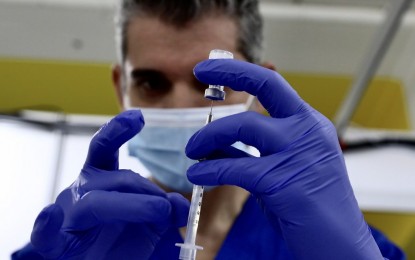
JAB PREPARATION. A healthcare worker prepares a dose of Covid-19 vaccine at California Polytechnic State University in Pomona, Los Angeles County in this February 2021 photo. About 47.8 percent of the United States population is fully vaccinated against Covid-19. (Xinhua)
WASHINGTON – US drugmaker Pfizer on Thursday revealed its plan to develop a booster dose of its coronavirus vaccine to better protect people from growing variants, heightening hesitancy of the unvaccinated population and sparking confusion around the United States on whether a booster shot is needed.
Pfizer and its partner German firm, BioNTech, announced Thursday they plan to seek approval for a booster shot within weeks, predicting that people would require a vaccine boost six to 12 months after being fully immunized.
The two companies said they have seen encouraging data in the ongoing trial of a third dose of its current Covid-19 vaccine.
Initial data from the study demonstrate that a booster dose given six months after the second dose has a consistent tolerability profile while eliciting high neutralization titers against variants including the highly transmissible Delta variant, which can be five to 10 times higher than after two primary doses.
"As seen in real world data released from the Israel Ministry of Health, vaccine efficacy in preventing both infection and symptomatic disease has declined six months post-vaccination, although efficacy in preventing serious illnesses remains high," the two companies said in a statement.
They expected a decline in vaccine efficacy against symptomatic disease over time and the continued emergence of variants.
They said that based on the totality of the data to date, a third dose may be needed within six to 12 months after full vaccination, to maintain the highest levels of protection.
Shortly after the announcement from Pfizer and BioNTech, the US Centers for Disease Control and Prevention (CDC) and the US Food and Drug Administration (FDA) released a joint statement on vaccine boosters.
"Americans who have been fully vaccinated do not need a booster shot at this time," said the statement.
The two agencies added that people who are fully vaccinated are protected from severe illness and death, including from emerging variants such as the highly contagious Delta variant which is now the dominant strain in the United States.
"FDA, CDC, and NIH (the US National Institutes of Health) are engaged in a science-based, rigorous process to consider whether or when a booster might be necessary," said the statement.
The decision, the statement said, will be only partly informed by data from drug companies.
Delta, which was first found in India and is now in over 100 countries, represented over 50 percent of new infections in the United States over the two weeks ending July 3, according to the CDC.
Experts are concerned the variant will cause a surge in new cases this fall, hitting the unvaccinated population the hardest.
About 47.8 percent of the U.S. population is fully vaccinated against Covid-19, and 55.3 percent of the population has received at least one shot as of Friday, CDC data show. (Xinhua)
